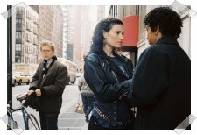|
|
||||
|
|
by Jeffrey Chen  I find movies based on musicals I've enjoyed to be among the most difficult to judge fairly. Why? Because if I liked the musical, it's probably due in large part to how much I enjoyed the music. And no matter how they make the movie version, that music is likely to carry over, giving me at least one sure reason to smile as I watch. For instance, take Chicago -- the movie itself is still one I wouldn't call great, but the songs are infectious to me. The only tradeoff comes with who's singing the songs, and, in that movie's case, Catherine Zeta-Jones's fiery renditions trump the not-so-impressive versions delivered by Richard Gere. So what about Rent? The job here seems doubly difficult because the songs are performed by most of the original Broadway cast. Taye Diggs, Wilson Jermaine Heredia, Jesse L. Martin, Idina Menzel, Adam Pascal, and Anthony Rapp -- they're the voices I'm already used to from listening to the Broadway soundtrack on CD. And the two replacements more than hold their own -- Tracie Thoms is an amazing find, and silver screen regular Rosario Dawson makes herself a strong case for a career in musicals. It didn't take long for the music to overwhelm me, reminding me of why I loved the show. Rock opera-styled songs, fueled by humor, bitterness, joy, and rage, mythologize themselves with catchy riffs and playful genre exploration. I remembered how different and refreshing they were when I had first heard them. By the time my eyes were tearing up to the words, "There's only us, no day but today," I thought to myself the producers could've just filmed the actors on a stage singing this stuff, and I would've liked it. Alas, after the movie was over, I found enough reason to raise a more objective eye to it. What I noticed, most disappointingly, was how the story's second act (in the stage show, that would be it's last hour or so) felt weak and incomplete. It had been reduced to about the film's last third, and was missing vital components to the dramatic climb to the climax, most notably the majority of a song called "Goodbye Love." As a result, Rent ends on a much tamer note than it does on stage. These pulled punches have a more damaging effect on the story's dramatic arc than one might initially suspect. Much of Rent's appeal comes from its relatively harsh, unapologetic view of realities -- after all, this was a musical that centered on the poor, featured major homosexual characters, and looked the AIDS crisis in square in the eye. Humble doses of hope and love only look that much brighter emerging from deeper, darker caverns. I might call Chris Columbus's direction unimaginative, but at first it makes some sense -- he uses plenty of circling, tracking shots that focus on the performers and otherwise tries not to get in the way. However, you can feel him being caught in the exuberance of the numbers in the first half, as these are the ones that are choreographed and shot with a sense of spirit (albeit rather straightforwardly). But Rent should be one part joy and two parts pain; from Columbus's focus, you wouldn't be able to tell this. The descent of the central relationship between Roger (Pascal) and Mimi (Dawson) feels glossed over when it should have hit the hardest. Rent is about small, personal triumphs in the faces of oppressive forces from every direction -- health, economics, big commerce, and the personal tendencies toward self-alienation as a coping mechanism. The fact that I couldn't feel this punch in the gut, like I had after seeing it on stage, meant something was lacking. The movie overdosed on its lighter side, softballing the grittier aspects of its tale. Yes, you could say this feeling might've come from my familiarity with the material -- if I know what's coming, I minimize the impact. But I could counter by saying I can get more emotionally involved by listening to my CD sountrack again. Yet, Rent the movie still adds up to something special -- if nothing else, it's now a revisitable, visually represented document of a very good show, with juice supplied by the commitments of many of the original players (although almost a decade older). I woudn't say it's magic as a movie all its own, but it does remind me of the magic I experienced not so long ago. (Released by Columbia Pictures and rated "PG-13" for mature thematic material involving drugs and sexuality, and some strong language.) Review also posted on www.windowtothemovies.com. |
||
|
© 2026 - ReelTalk Movie Reviews Website designed by Dot Pitch Studios, LLC |



